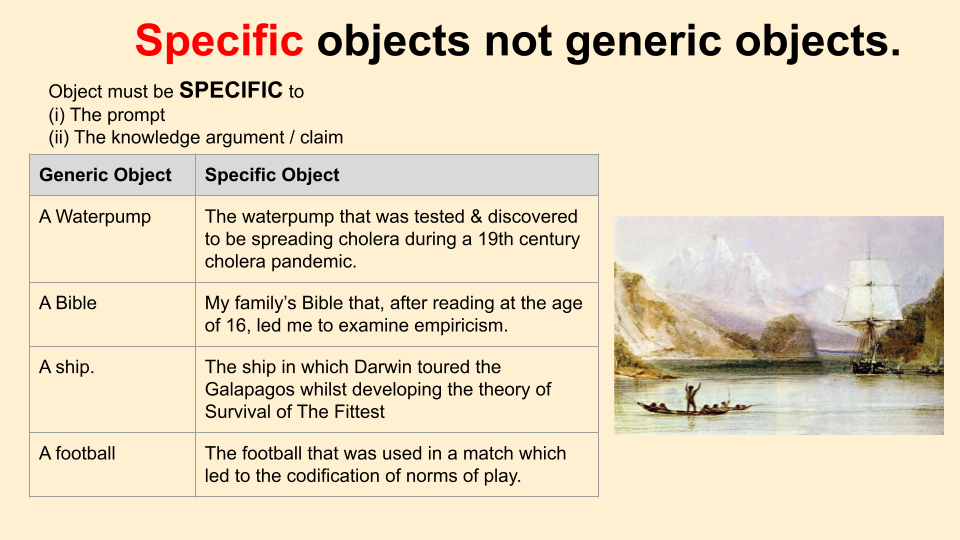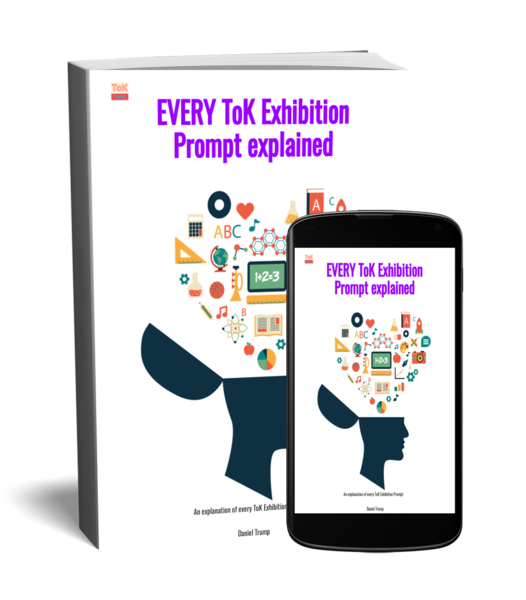Do the objects need to be personal ?
A frequent question I get asked is "Do the objects in my ToK Exhibition need to be personal to me?"
The answer is "No, but…,"
Why do people think ToK Exhibition objects have to be personal?
Nowhere in the IB marking scheme for The Exhibition does it say that the objects have to be personal to the student. The marking scheme does say that the objects have to have “Specific Real World Contexts”, and this gives us a clue as to why people think that the objects have to be personal. Let’s dig deeper..,
ToK Subject Report is a report written by the IB Tok Examiners (it’s a treasure trove of information - you should check it out), the Subject Report in May 2022 says:
Teachers should encourage their students to find objects from the real world rather than look for some generic image found online or elsewhere. This is basic to a successful exhibition so of utmost importance. Objects were sometimes detached from the candidate’s own experience as a knower or were too general to be successful (‘the bible’, ‘an iPhone’). This did not allow for the specificity required to explore the prompt and made clear the problem with generic images of objects. Candidates generally did well when they chose personal objects (a household object, an heirloom) or objects which were meaningful to them (a book they had read or studied, a statue or monument of a person they had studied in history or place they had visited, something from the news which they were interested in).
ToK Subject Report, IB, May 2022
So personal can be good, but not essential ?
It then goes on to say:
Images of objects that lacked in specificity led to unfocused commentaries. “Specific” here relates to the particularity, uniqueness, or singular nature of the object. Although a personal context can make an object more specific it is not the only way of doing so. Also, the specificity has to have a reason—there is no difference between “a bible” and “the bible from which my grandmother used to read to me when I was a child” unless the candidate uses the specificity of the object in its context to make some TOK related point.
ToK Subject Report, IB, May 2022
So, it’s not the ‘personal’ aspect of the object which is important, it’s the specificity of the object which is important. And the specificity has to relate to a ToK Knowledge point. If you want to know more about that then watch the next video in this series.
What makes an object "specific" ?
Let’s just look in a bit more detail at what is meant by a specific object:
Let's have a look at an example arising from an actual prompt, the prompt is “are some types of knowledge more useful than others” ? I'm going to look at the claim that the usefulness of knowledge depends on context if you don't know what I mean by claim then watch the next video in this series. So we're looking at the claim that the usefulness of knowledge depends on context and our object is a cactus and we've used the cactus because we're arguing that knowledge of which Cactus can provide water is more useful in a desert than a city, in this case the desert and the city are “context”. On the other hand we could use the Saguaro cactus that children who were lost in the Australian desert in 1968 used to get water from.
I think that you can see that the Saguaro cactus example is a lot more specific than the first generic cactus.
In this case your personal cactus, sitting on your window ledge at home, would not be a better object than the Saguaro Cactus because your personal cactus is not as specific to the prompt as the Saguaro Cactus.
If you need more help with your Exhibition check out the resources at this link, including the very popular Every ToK Exhibition Prompt Explained.
This is the third blog in this ToK Exhibition Mini Series. The other posts are:
#1: Basic ToK Exhibition Mistakes
#2: Linking the object to the Prompt
Other ToK Exhibition Resources can be found at:
3 simple steps to write up 1 object for the ToK Exhibition.




